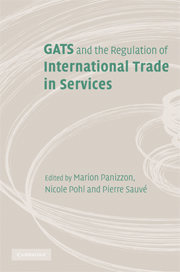Book contents
- Frontmatter
- Contents
- Contributors
- List of figures
- List of tables
- List of abbreviations
- Preface
- PART 1 Beyond regulatory control and multilateral flexibility: Gains from a cosmopolitan GATS
- PART 2 Unexplored economic, political and judicial dimensions of GATS
- PART 3 The limits of request–offer negotiations: Plurilateral and alternative approaches to services liberalisation
- 6 Services post-Hong Kong – initial experiences with plurilaterals
- 7 Negotiating approaches from a Member's perspective
- 8 Evaluating alternative approaches to GATS negotiations: Sectoral, formulae and others
- 9 Trade liberalisation under the GATS: An odyssey?
- PART 4 GATS case law: A first assessment
- PART 5 Market access, national treatment and domestic regulation
- PART 6 Unfinished business: Safeguard and subsidy disciplines for services
- PART 7 Challenges to the scope of GATS and cosmopolitan governance in services trade
- PART 8 Conclusion
- Index
- References
9 - Trade liberalisation under the GATS: An odyssey?
from PART 3 - The limits of request–offer negotiations: Plurilateral and alternative approaches to services liberalisation
Published online by Cambridge University Press: 03 September 2009
- Frontmatter
- Contents
- Contributors
- List of figures
- List of tables
- List of abbreviations
- Preface
- PART 1 Beyond regulatory control and multilateral flexibility: Gains from a cosmopolitan GATS
- PART 2 Unexplored economic, political and judicial dimensions of GATS
- PART 3 The limits of request–offer negotiations: Plurilateral and alternative approaches to services liberalisation
- 6 Services post-Hong Kong – initial experiences with plurilaterals
- 7 Negotiating approaches from a Member's perspective
- 8 Evaluating alternative approaches to GATS negotiations: Sectoral, formulae and others
- 9 Trade liberalisation under the GATS: An odyssey?
- PART 4 GATS case law: A first assessment
- PART 5 Market access, national treatment and domestic regulation
- PART 6 Unfinished business: Safeguard and subsidy disciplines for services
- PART 7 Challenges to the scope of GATS and cosmopolitan governance in services trade
- PART 8 Conclusion
- Index
- References
Summary
In over seven years, the services negotiations under the GATS have produced little, if any, progress in terms of commercially meaningful offers. A number of Members elected to remain on the sidelines, sometimes despite significant autonomous liberalisation, while others confined their offers to predominantly cosmetic improvements of existing commitments. The absence of momentum stands in remarkable contrast to what has happened in other fora. It looks as if governments are reluctant to ‘squander’ negotiating coinage at the multilateral level, which they are pleased to use in a bilateral or regional context. Against this background, this chapter discusses why the momentum that has driven past trade rounds under the GATT has not, or not yet, been discernible. While the Hong Kong Ministerial Declaration may be viewed as an encouraging response to the deplorable state of play, the services negotiations have since fallen victim to (non-)events in other areas, notably agriculture and non-agricultural market access. The litmus test on Members’ readiness to promote multilateral services liberalisation or, as a minimum, to bring their offers more closely into line with applied regimes, is thus still outstanding. Also, doubts linger whether the explicit exemption of LDCs, in paragraph 26 of the Hong Kong Declaration, from the expectation to undertake new commitments is in these countries’ best economic interest. There is little reason to assume that they would not benefit as well from binding ongoing reform projects or at least past reforms that have been tested successfully in practice.
- Type
- Chapter
- Information
- GATS and the Regulation of International Trade in ServicesWorld Trade Forum, pp. 209 - 222Publisher: Cambridge University PressPrint publication year: 2008
References
- 1
- Cited by



